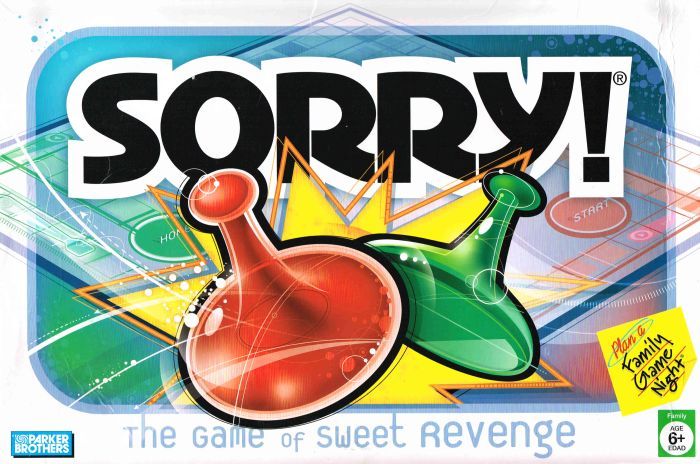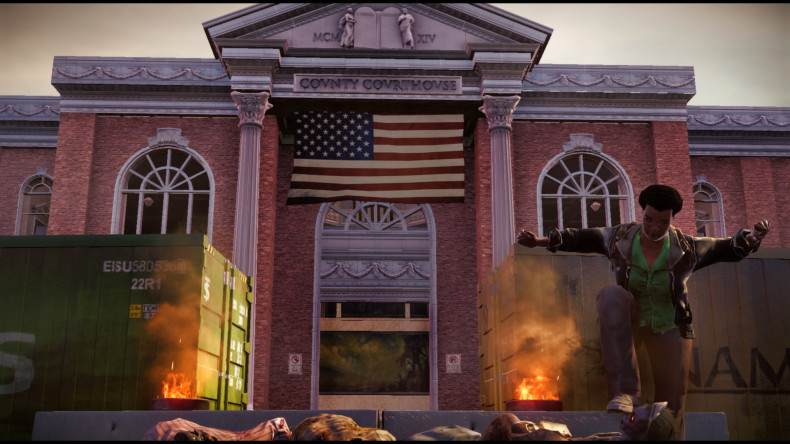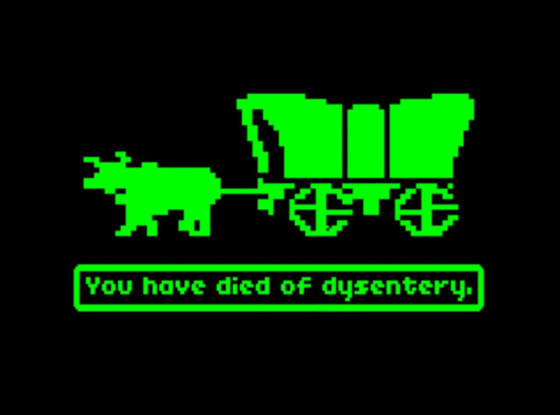It’s the holiday season, and I’m seeing a lot of interaction from friends talking about visiting families and holiday parties. Some friends are back at homes where they are loved and accepted; some friends are not. Some friends are with the family they were born into, and some friends are with the families they’ve chosen.
It’s the holiday season and I’m not feeling very festive. Sure, I had a holiday party to go to, with the family of my partner, where I needed to return the mannequin head I won accidentally last year. Their yearly tradition of white elephant gifts. It’d be rude not to show up.
But, inevitably, the holidays make me think of family, and how the family I was adopted into and I have never really gotten along.
Especially my mother.
We stopped talking this year, by my choice. Once shortly before the election and then once again after, when I told her to stop speaking to me. It came about due to her comments about people of color, immigrants, and how my “lifestyle” was affecting her religious beliefs. I honestly offered to help her with her racist, xenophobic, and homophobic views, but when I sent her my ultimatum of “either start to realize your views hurt people or don’t talk to me again,” her response was just “okay.”
So happy holidays, I’ve excommunicated myself from half of my family, and I’m on shaky ground with my dad’s side.
But Jynx, what does this relationship with your mother have to do with video games?
A lot, actually.
—
“Girls don’t play video games” was a rule that was spoken in my household but not upheld in a way that really would have been expected (play along, at this time I was a “girl”). Because if it was strictly followed it would mean that my sister and I would not have played any games growing up.
But we played DOOM and Earthworm Jim and Sonic the Hedgehog and Myst. Computer games were fine, but the N64 and later the Xbox were randomly off limits for us, but not for our brother.
Yet I still got to play Mario Party, Diddy Kong Racing, Mario Kart, and…really anything we owned on the N64. So the rule wasn’t really “Girls don’t play video games,” but rather “Girls don’t play video games when we deem it not okay, or when their brother wants to play, or when we arbitrarily decide it’s inappropriate.”
(For example: DOOM was fine. Diablo was not. Something about the devil being in it. Despite the fact that you are fighting Diablo).
The rules about whether or not my sister and I could play games were arbitrary at best, and only upheld when convenient. It wasn’t as if we noticed at the time; this was back when parents let their kids play outside till sunset (or after) when you lived in White Suburbia. So, it was a rule, albeit one of the most broken ones, and by middle school, it was completely moot.
So instead of insisting we didn’t game, my mother would start heavily judging every game we played. I always thought this was due to the age difference between my brother and us–he was two years older. But honestly, I think it was because he was male.
My mother seemed to be the one with Opinions on video games, not my dad. My dad was mostly in the “games make you asocial” camp, but he even gave up that after a while. My mom, however, seemed to think a lot about what games would do to her precious little “girls.” This never seemed to come up with my brother, though.
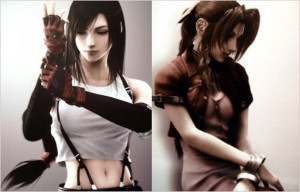 Granted, this is coming from my (limited) memory. But my mother always seemed starkly aware when I was playing a game that possibly featured a woman in not enough clothing (remember, I like JRPGs. So this was often). I remember a distinct conversation with her about why I couldn’t like Tifa Lockheart from Final Fantasy VII and that I really should make Aerith my favorite character, because she was so “pure, innocent, and not a slut.” Also she wore pink. Which I hated.
Granted, this is coming from my (limited) memory. But my mother always seemed starkly aware when I was playing a game that possibly featured a woman in not enough clothing (remember, I like JRPGs. So this was often). I remember a distinct conversation with her about why I couldn’t like Tifa Lockheart from Final Fantasy VII and that I really should make Aerith my favorite character, because she was so “pure, innocent, and not a slut.” Also she wore pink. Which I hated.
My mother also thought that Rufus Shinra was a respectable man and I should look up to him. At the time, I didn’t realize why that was so unsettling (Rufus is my sister’s favorite character, but probably not for the reasons my mother wanted). Looking back, I wonder if my mother really supported Rufus because he was a white imperialist who used force and fear to get his way.
The problem came up again when I started Final Fantasy XII. My mother hated Fran. Granted, Fran has a lot of problems, because bunny girl in combat lingerie and battle stilettos, but she and Balthier are still my favorite characters. She and Balthier are interesting, well developed characters with complex narratives, who talk about seeking people they belong with, and finding what it means to be themselves.
But no, I shouldn’t like Fran.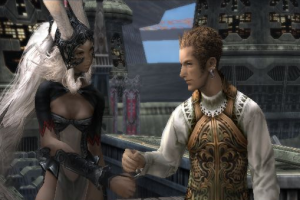
If this had been a conversation about how Fran’s body was being exploited for the male gaze, and about how her armor (and her race, the Viera) were simply fanservice and took away her agency as a woman, that’d be different. But it wasn’t. My mother hated Fran because she clashed with her WASP values, and instead of having a discussion about why gaming industries decide they need to have so much fanservice, she just expected me to see Fran as a bad character.
Don’t even get me started on the conversation she had with my sister about why Ming Numara in Lost Odyssey could not be a reasonable ruler. I mean, look at what she’s wearing! We didn’t have the heart to tell her that the “respectable ruler” she compared Ming to–Gongora– was the villain.
We had similar discussions when I revealed that my favorite character was Elfe, from the Japanese-only cell phone game Before Crisis: Final Fantasy VII. In my wanting-to-please-my-mother brain, Elfe was the perfect character. She was a strong female lead with an army. She carried a sword and fought for what she believed in. And she was really pretty reasonably dressed, especially for a woman in a JRPG.
My mother wasn’t happy. Elfe didn’t look “feminine enough.” She was concerned because Elfe could be mistaken for a boy. Why wasn’t she prettier? The fact that she was an eco-terrorist and leading an army meant nothing. She should at least be wearing a dress.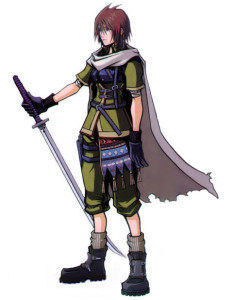
It was interesting to me because my brother’s favorite games and characters were never called into question. Granted, he kind of stuck to first person shooters like Mech Assault and Halo. But she never lectured him about Cortana’s state of dress (though I got that lecture. Shouldn’t have told her that the AI was my favorite character). My brother’s actions in games were never called into question either.
He got our shared Xbox Live account banned for being sexually explicit and using racial slurs. When I told my mother about this, this was just “boys being boys” and I got in trouble for tattling. She also got mad at me when I tried to make our new account name “HellWyrm” (reference to the 36+ shield dragon boss in FFXII) over my brother’s suggestion of “PullDickOut.” Because my name suggestion had “hell” in it.
I realize now, looking back, that my mother’s idea of what my sister and I should be extended into the media we interacted with. While my brother was not nearly policed as much as we were, this was because, in her mind, he was a “boy being a boy.” But my twin and I, being interested in games that spoke of revolution, were not doing “Girl things.” I also genuinely think she was afraid that us seeing female bodies “would turn us gay.” Since no “good Christian girl” would dress like Fran or Tifa or Ming or the millions of other female characters my mother disapproved of, they were all obviously sexually deviants and aimed to turn my sister and I into the same.
This made it very difficult when games started teaching me lessons my mother never would. Lessons in self reliance, and fighting for what you believe in. Lessons in looking at a character for who they are, not what they are wearing. Lessons in how female bodies are exploited by game industries, and how fucked up it is that heroes are expected to be male.
Games, not my mother, made me into a “filthy SJW.” But my mother helped. Because I saw the hypocrisy of my mother’s expectations for my sister and I reflected in the games I played. I dove into social issues that my mother said were fine, because I wondered why people were treated unfairly in games. I started to back away from self-inflated patriotism and began working with people my mother seemed to hate, even behind her “love thy neighbor” edicts.
All of this should have been a clear indication that we wouldn’t get along later in life, but I am forever an optimist. But, then again, my mother should have been ready when my favorite character was a gender-neutral revolutionary.
—
Perhaps more confusion comes from the times that my mother, sister, and I would work on cosplay together. It was very clear that my mother was much happier making dresses and skirts and ornate outfits than pants and tunics.
That’s all well and good. As I’ve learned, making pants is kind of a pain. Our first costumes were kimonos and the second were Vivi (Kingdom Hearts variant) and a White Sage from FFIII
But you think she would have protested a little more when my sister and I decided to be Chii and Freya from the Manga/Anime Chobits. Especially because, at face value, those twins are sex robots in scantily clad outfits.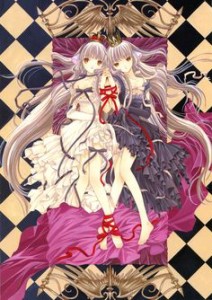
Of course she lengthened the skirts and raised the bodices for everyone’s comfort, but it never seemed to bother her that we wanted to wear these outfits. They were “girly” (Poor twin got stuck wearing the pink and frills because I put my foot down and demanded to be the person in black).
My mom liked Chii and Freya so much she made two variants of the costumes.
Perhaps she never really understood the series they came from. I could have sworn we told her. But even going off of looks alone, Chii and Freya present suspiciously.
And once she started making dresses, I let her down again, because after two years of dresses, I wanted to go back to pants. Perhaps it was my imagination, but she seemed less enthusiastic to work on costumes like the X-Down Mad Hatter or Elfe or Wander from Shadow of the Colossus. She would do them, with me, because they made me happy, but I could tell her heart wasn’t in it. She definitely looked more forward to making dresses or female characters with ornate outfits with my sister.
She was the happiest I’d heard her in years when we were discussing costumes last, and I told her that Sakura from CardCaptor Sakura was on the docket for cons this year. I thought it would be a good project for me to learn. Plus, it would be a dress, which would make my mom happy.
I don’t blame her, not one bit. It makes sense now. I just wish I could have been there when my sister proposed Helios from Sailor Moon.
—
As I got more into gaming, my mother would strive to watch me play more. Sure, she’d often fall asleep, or I’d change which game I wanted to play so we wouldn’t have as much discourse (as a result, my mother was an avid Animal Crossing, Harvest Moon, and Kingdom Hearts fan). But sometimes I wonder if the conversations we had growing up would have been different if I’d had games with better representation.
If I’d had games with characters like Krem and Tracer, visible queer characters who make impacts on the society around them. Games with people of color in the main role, or games like Never Alone that provide a gateway into a culture so unlike our own. Games that spit in the face of gender roles, and have female leads and male healers and all genders equally represented.
But maybe not, because my mother insisted Final Fantasy XIII’s Fang and Vanielle were “just great friends.” No, Mom, they’re lesbians. Lesbians that would rather die together than live apart. Maybe not, because my mother rebels against learning about cultures that may subvert her tiny world.
—
Games have also taught me that sometimes the greatest family you have is the one you choose. I have a great family that way, with the folks from NYMG and my friends, with my mentors and my partner and my cat. It is here that I feel like I belong. I may screw up and say something stupid, or not agree with everything they say, but we all can learn together.
I don’t think it was ever my parents’ fault that I felt like I didn’t belong in their family. When you’re struggling to understand your own identity, sometimes you alienate yourself to find it. Now, when I came back, the feeling of isolation and difference that came might have been their fault.
I will always feel guilty that I’m not the daughter my mother wanted. That instead, she got a queer transperson. I hate causing grief or strife to people I care about. And I do care about my mother. Games also taught me that: forgiveness is key, even if you remove the person you forgive out of your life.
These holidays will be hard, and may continue to be hard every year after, as memory softens hurts and I will always miss the good times I had with my mother. I’m fortunate to have the support of people who accept who I am. Maybe one day, my mother will be one of those people.

